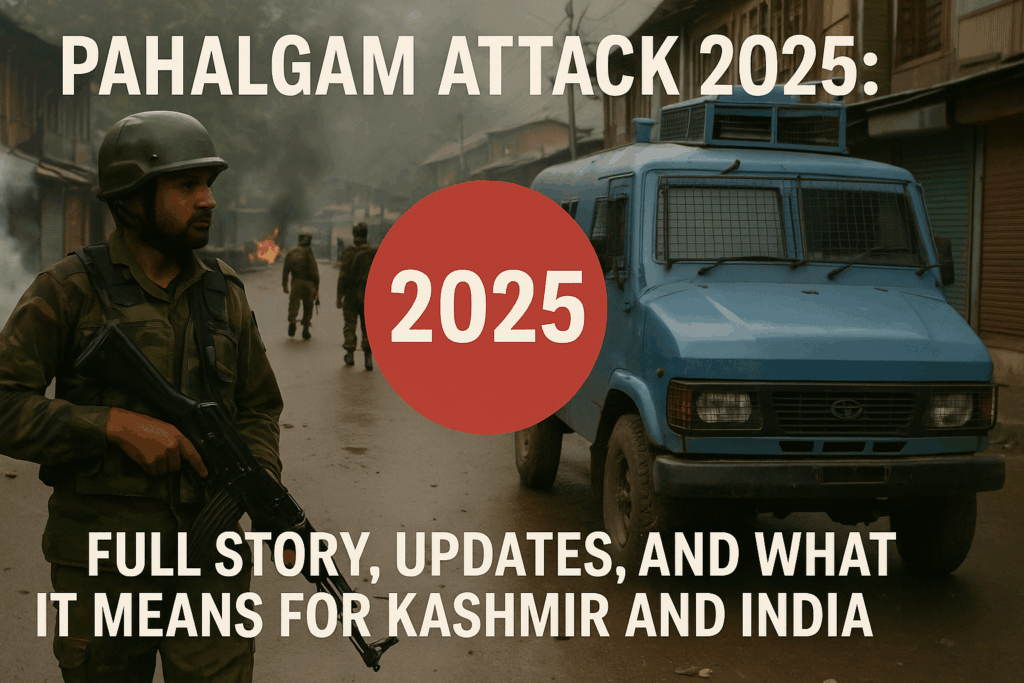On April 22, 2025, Pahalgam, a serene tourist paradise in Jammu and Kashmir, witnessed one of the deadliest terrorist attacks in recent history. What was once a symbol of natural beauty turned into a scene of devastation and grief, as militants targeted innocent tourists, shattering Kashmir’s fragile return to peace.
This article dives deep into the timeline, investigation details, government response, international reactions, and the impact of the Pahalgam attack — offering a complete, up-to-date understanding of the situation.
Table of Contents
📍 What Happened at Pahalgam?
- Date: April 22, 2025
- Location: Baisaran Valley, near Pahalgam, Anantnag District, Jammu & Kashmir
- Nature of Attack: Five heavily armed militants attacked a group of tourists at Baisaran meadow, a popular trekking and sightseeing spot.
- Weapons Used: AK-47s, M4 carbines
- Tactics: Witnesses reported that the attackers wore military-style clothing and selectively targeted individuals based on religion.
Casualties
- Deaths: 26 civilians
- Injured: Over 20
- Victims: Included Indian nationals from various states (Karnataka, Kerala, Maharashtra, Odisha, West Bengal, Haryana, Uttar Pradesh, Tamil Nadu) and two foreign nationals (Nepal and UAE).
- Several victims were newlywed military officers and government officials.
🔎 Who Carried Out the Attack?
- Claim of Responsibility: The Resistance Front (TRF), a proxy of Lashkar-e-Taiba (LeT), claimed responsibility.
- Stated Motive: The group cited “opposition to demographic changes” in Kashmir — referring to non-locals settling in the valley.
Key Suspects Identified:
- Asif Fauji (alias Moosa) – Senior Lashkar commander
- Suleman Shah (alias Yunus)
- Abu Talha (alias Asif)
Authorities believe these militants crossed over from Pakistan-occupied Kashmir (PoK) in early April and meticulously planned the attack.
🛡️ Security Lapses and Intelligence Failure
- Intelligence agencies had intercepted conversations hinting at a possible strike, but no action was taken.
- A specific warning came from a known terrorist in PoK days before the attack, which was ignored.
- The Baisaran area had no permanent security posts, despite being a major tourist attraction.
This oversight has now triggered major criticism of the local administration and security apparatus.
🚨 Immediate Aftermath
- Massive rescue efforts: Locals, including pony handlers, played a heroic role in saving the injured.
- Shelter offered: Gurudwaras in nearby areas opened their doors to tourists fleeing the violence.
- Tourism Collapse: Thousands of tourists fled the valley immediately. Hotels reported near 90% cancellations overnight.
🏛️ Government Response
National Level
- Army and Paramilitary Deployment: The Centre is considering permanent military presence in vulnerable areas like Baisaran.
- Counter-Terrorism Drive: 175+ suspects detained; massive cordon-and-search operations underway.
- Visa Suspensions: Visas for Pakistani nationals suspended indefinitely.
- Diplomatic Moves:
- Expelled Pakistani diplomats.
- Suspended talks on the Indus Waters Treaty.
- Closed border crossings.
Official Statements
“We will not only find the perpetrators but also those behind them. India will not bow down to terrorism.”
— Defence Minister Rajnath Singh
🌎 International Condemnation
The global reaction was swift and supportive of India:
- United States, United Kingdom, Saudi Arabia, UAE: Condemned the terrorist attack.
- United Nations and European Union: Urged both India and Pakistan to avoid escalation but acknowledged India’s right to defend itself.
- China and Russia: Issued balanced statements emphasizing stability in South Asia.
🧭 Broader Impact on Kashmir and India
1. Tourism Industry Hit Hard
Kashmir’s economy depends heavily on tourism. The attack led to a mass exodus of tourists, impacting thousands of local livelihoods.
2. Communal Tensions Rise
Post-attack, there have been isolated incidents of harassment of Kashmiri students across India. Many civil society groups and citizens have urged calm, emphasizing that the attack does not represent Kashmiris at large.
3. India-Pakistan Tensions
- Diplomatic relations have deteriorated further.
- Exchange of fire reported along the Line of Control (LoC).
- Pakistan denies involvement, but India is pushing for international isolation of Pakistan over cross-border terrorism.
📆 What Happens Next?
- Amarnath Yatra Preparations: Massive security arrangements are underway for the pilgrimage starting July 3, 2025.
- Anti-Terror Crackdown: Operations in Kashmir valley are expected to intensify over the coming weeks.
- Diplomatic Offensive: India is rallying international support to designate TRF leaders as global terrorists under UN sanctions.
✍️ Final Words
The Pahalgam attack is a stark reminder of the challenges India still faces in Kashmir despite years of efforts to restore peace. It has reignited debates on security, governance, and the future of Indo-Pak relations.
While terrorists seek to spread fear, the solidarity shown by ordinary Kashmiris — rescuing and sheltering tourists — offers hope that humanity will prevail over hate.
Stay tuned for continuous updates on Pahalgam, Kashmir security measures, and India’s evolving national response.
